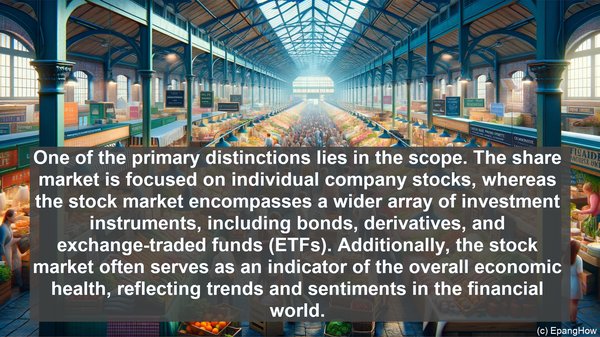Introduction: The World of Investments
Hello everyone, and welcome to another insightful article on the world of investments. Today, we’ll be exploring the intriguing realm of share market and stock market. Often used interchangeably, these terms have distinct meanings. So, let’s dive in and unravel the differences.
Defining the Share Market
The share market, also known as the equity market, is a platform where individuals and institutions can buy and sell shares or ownership stakes in publicly listed companies. It’s essentially a marketplace for trading company stocks. The share market facilitates capital raising for businesses and provides investors with opportunities to participate in a company’s growth and profit.

Understanding the Stock Market
On the other hand, the stock market is a broader term encompassing various exchanges, such as the New York Stock Exchange (NYSE) and the London Stock Exchange (LSE). It refers to the overall marketplace where stocks, bonds, commodities, and other financial instruments are bought and sold. While the share market deals specifically with company shares, the stock market includes a more extensive range of investment options.
Key Differences: Share Market vs. Stock Market
One of the primary distinctions lies in the scope. The share market is focused on individual company stocks, whereas the stock market encompasses a wider array of investment instruments, including bonds, derivatives, and exchange-traded funds (ETFs). Additionally, the stock market often serves as an indicator of the overall economic health, reflecting trends and sentiments in the financial world.

Trading Mechanisms
When it comes to trading, the share market primarily operates through exchanges, where buyers and sellers interact directly. In contrast, the stock market employs various trading mechanisms, such as over-the-counter (OTC) trading and electronic trading platforms. This diversity in trading methods adds to the dynamism of the stock market.
Regulatory Framework
Both the share market and stock market are subject to regulatory oversight. However, the regulatory framework for the stock market is often more extensive due to the diverse range of financial instruments involved. Regulatory bodies, such as the Securities and Exchange Commission (SEC) in the United States, play a crucial role in ensuring fair and transparent trading practices.
